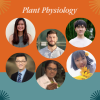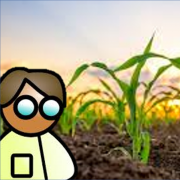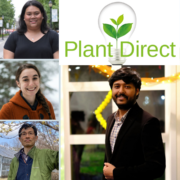Reflections on my move from academia to a startup
Guest post by Christy Gault
My interest in agricultural biotechnology began in an unlikely place. In an undergraduate Wetland Ecology course, we took a field trip to a small patch of wilderness in rural upstate New York. Canoeing past dense vegetation under a brilliant blue sky, I felt a sense of wonder in nature that had eluded me in the urban sprawl of my childhood. That moment, among others in different courses, kindled a desire to preserve wild places in this world. I decided that the best strategy to accomplish this with my liberal arts degree in molecular biology was to become a plant geneticist and reduce the environmental footprint of agriculture.
To utilize my degree for sustainable intensification, I set out to develop both molecular and computational skills. Consequently, I pursued interdisciplinary training for my Ph.D. and postdoc with the support of NSF fellowships. My dissertation tackled a developmental genetics problem in maize using molecular and bioinformatic approaches with Drs. Mark Settles and Brad Barbazuk. After my Ph.D., I entered two different fields that were wholly new with mentors at two different institutions. My postdoctoral research melded quantitative genetics and plant physiology working with Drs. Edward Buckler and Michael Thomashow. Given that my research spanned multiple fields, I was given the moniker of ‘molecular biologist’ by computational folks, even while being called a ‘quantitative geneticist’ by molecular folks. These experiences and a lack of a unifying label led to self-doubt. Consequently, imposter syndrome plagued me for a long time. However, I came to learn that my diverse background in actuality helps me analyze problems from multiple angles. Once my Ph.D. and postdoctoral training were finished, I felt ready to work in crop improvement.
Even having decided my main goal, envisioning an ideal job took a lot of self-reflection. I wanted to spend most of my time conducting research that would lead directly to improved varieties. As a result, I focused on industry, where success would be measured by contributions to products and not by publications or grants. I was also excited by the idea of working in networks of equally skilled scientists, rather than being a sole leader of a lab that mentored early-career scientists. This preference developed earlier in my life and underscores the importance of introspection. In my earlier years as an athlete, I was always drawn to team sports rather than single-player sports. Having settled on industry, I next needed to find a good fit with a company.
I applied for jobs at large and small agricultural companies as well as agricultural biotechnology startups. Inari Agriculture, a Cambridge-based startup, seemed especially exciting because they are re-imagining how agricultural products are brought to market. During the interview, they described a vision for next-generation breeding that incorporates genome editing and computational crop design. Inari’s mission aligned with my values, so I decided to join their team. I also felt that my particular strengths were well-suited to the soybean project lead position that they offered me. My breadth of training enables me to communicate effectively with members of the soybean team who are specialists in diverse fields. Effectively steering the project requires constant coordination with many different people in the company, which feels natural to an extrovert. Furthermore, designing experiments and allocating resources is genuinely fun for me, partly because I am detail-oriented and reasonably organized. I feel like my work at Inari can directly translate to farmers’ fields and has a real chance at making agriculture more efficient.
There are certainly many effective ways to find your place in the plant research landscape. Here are the particular lessons I learned when deciding what shape I wanted my career to take.
Pay attention to those quiet moments of excitement to find what motivates you. Observe the times you feel most alive, and figure out why. In this way, I found that environmental preservation is my main goal.
Carefully assess your soft skills. This is difficult and requires you to become a student of your own self. I picked a job that plays to my strengths, and I reach out to others with complementary skills.
Embrace discomfort. When learning a new skill amidst experts, it’s natural to feel out of place. The more questions I asked, the faster I progressed, even while revealing my own ignorance in the process. Learning new disciplines has helped me address a wider array of problems.
Work with people who value family life. My partner and I have had trouble permanently solving the two-body problem, but empathetic PIs and managers that allow me to work long-distance have made a world of difference. Search out managers and advisors who care about you as a person.
Make friends across institutions. When possible, socialize at conferences and meet visiting speakers. I heard about my current job through my network of conference buddies.
As with most advice, this is admittedly anecdotal, and readers should consider whether these points apply to their lives. I hope that these lessons I’ve learned in my early career can help you when considering your next step.
 Author: Christy Gault, Soybean Product Manager at Inari Agriculture https://www.linkedin.com/in/christygault/
Author: Christy Gault, Soybean Product Manager at Inari Agriculture https://www.linkedin.com/in/christygault/









Leave a Reply
Want to join the discussion?Feel free to contribute!